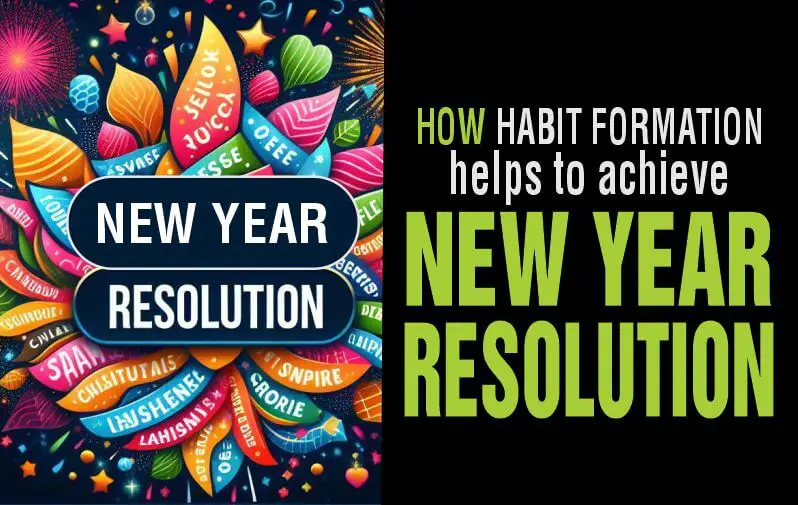Discover how habit formation helps to achieve New Year resolutions and strategies to make lasting changes and achieve your goals.
As we are into the new year proper, many people take the opportunity for self-improvement by setting new year resolutions and goals and hope to be dedicated to them.
From losing weight to saving money and getting a new skill, at the core of these resolutions lie breaking old habits and forming new ones.
While the idea of making positive changes can be exciting, it is not as easy as it seems, and that is why many New Year resolutions fail.
While sticking to your new resolutions might be challenging, knowing how habits are formed and broken gives you a heads-up to be successful.
How Habits Influence Our Daily Lives
Habits influence our daily lives in profound ways, shaping our routines, decisions, and overall well-being.
They streamline our actions, allowing us to perform tasks with minimal cognitive effort.
Positive habits, such as regular exercise or healthy eating, contribute to physical and mental well-being, while negative habits, like procrastination or unhealthy snacking, can hinder productivity and health.
Habits also influence our long-term success like New Year resolutions, as they contribute to skill development and goal achievement.
Understanding and managing your habits can lead to positive changes, as you can intentionally create new, beneficial habits that will shape a more fulfilling daily life.
Overview of Habit Formation
Habit formation is a process of learning new behaviours that become automatic and part of you.
It is brought about by the interplay of signals, patterns, and rewards that develop loops in your brain.
These loops are habits that are determinants of the direction your life takes.
The Three Components of Habit
Habits are made up of three components –
- The cue
- The routine and
- The reward
The cue is a trigger that initiates the habit, such as a specific time of day or a particular emotional state.
The routine is the behaviour itself, the action or series of actions that make up the habit.
And the reward is the positive outcome or feeling that reinforces the habit, motivating to repeat the behaviour in the future.
Together, these components form a habit loop, a neurological pattern that becomes increasingly automatic with repetition, shaping your daily life and long-term behaviours.
Understanding this simple explanation of the science behind habit formation helps in keeping your New Year resolution and achieving your goals.
Related: Self-management Skills for Healthy Living
Common Challenges in Achieving New Year Resolutions
While some people make their New Year resolutions because others a doing the same, some go all the way and implement theirs and succeed.
If you are keen on succeeding with your New Year resolution, there are challenges you have to overcome as explained below:
1. Unrealistic Expectations: Setting overly ambitious goals can lead to frustration and disappointment.
2. Lack of Planning: Failing to create a clear, actionable plan for achieving the resolution can hinder progress.
3. Motivational Slumps: Sustaining motivation over time can be difficult, leading to wavering commitment.
4. External Pressures: Social or environmental factors may create obstacles to maintaining the resolution.
5. Old Habits Die Hard: Breaking entrenched habits that conflict with the resolution can be a significant challenge.
6. Time Management: Balancing the pursuit of the resolution with other responsibilities can be demanding.
7. Self-Doubt: Negative self-talk and self-doubt can undermine confidence in achieving the resolution.
Addressing these challenges through realistic goal-setting, strategic planning, and ongoing motivation can significantly improve the likelihood of successfully achieving New Year’s resolutions.
The Connection Between Habit Formation and New Year Resolutions

Habit formation complements resolutions by providing a framework for sustainable behavioral change.
When resolutions are built upon the foundation of new habits, they become more achievable and enduring.
For instance, a resolution to exercise regularly can be realized through the establishment of a daily workout routine, leveraging the power of habit to drive consistent action.
Similarly, successful weight loss resolutions often involve habitually healthier eating and portion control.
By integrating habit formation into resolutions, you can create lasting lifestyle changes, as evidenced by countless success stories of people who have transformed their lives through the power of habit-based resolutions.
How Habit Formation Helps to Achieve New Year Resolution
To apply habit formation to New Year resolutions, follow these steps:
1. Identifying Meaningful Resolutions: Choose resolutions that align with your values and are personally significant, increasing motivation for long-term commitment. You will find it difficult if you choose resolutions that do not resonate with you.
2. Set Clear and Specific Goals: Start by identifying specific and achievable goals for your New Year resolutions. For instance, if you resolve to exercise more, specify the frequency and duration of your workouts.
3. Breaking Down Resolutions into Smaller Habits: Once you have set your goals, break them down into small, manageable habits. This makes it easier to incorporate them into your daily routine. For example, if your goal is to read more books, form a habit of reading for at least 15 minutes every day.
4. Harness the Power of Cues and Triggers: Identify cues in your environment or daily routine that can prompt the desired habits, reinforcing their consistency. You should be deliberate about this.
5. Establishing a Routine and Creating Accountability: Integrate the new habits into a daily routine, and consider sharing your goals with a supportive friend or using habit-tracking tools to enhance accountability and motivation.
6. Reflect and Adjust: Regularly reflect on your habit formation progress. Evaluate what is working well and what needs adjustment. If you face challenges or setbacks, make necessary adjustments to overcome them. Learn from your experiences and continue adapting your approach until the habit becomes ingrained.
By following these steps, you can effectively integrate habit formation into your New Year resolutions, increasing the likelihood of success and long-term behaviour change.
Related: What is Personal Agency?
Common Pitfalls to Avoid

When forming new habits for New Year resolutions, it’s important to avoid these common pitfalls:
- Setting Unrealistic Expectations: Overly ambitious goals can lead to frustration and demotivation. Start with achievable habits and gradually increase the challenge.
- Allowing Setbacks to Discourage Progress: Setbacks are natural; instead of being discouraged, view them as opportunities to learn and readjust your approach.
- Not Adapting Habits as Circumstances Change: Life is dynamic, so be flexible and willing to adapt your habits to changing circumstances, ensuring they remain relevant and achievable.
Celebrating Progress and Maintaining Long-Term Habits
Celebrating progress and maintaining long-term habits involves several key strategies.
Firstly, recognizing milestones and achievements provides motivation and reinforces the value of the habits.
Secondly, making adjustments to ensure habits stay relevant involves adapting to changing circumstances and preventing stagnation.
Finally, sustaining long-term changes requires strategies such as regular reflection, seeking support from others, and cultivating a growth mindset.
Frequently Asked Questions
Why should you make small good habits a part of your New Year’s resolution?
Making small good habits part of your new year’s resolution builds a foundation for lasting change and gradual progress.
How can you achieve your New Year’s resolution?
You can achieve your New Year’s resolution by setting specific, achievable goals, creating a plan, and staying motivated and accountable.
Why setting New Year’s resolutions is important?
Setting New Year’s resolutions is important as it provides a fresh start, encourages self-improvement, and fosters a sense of purpose and direction.
Conclusion
Understanding how habit formation helps to achieve New Year resolution is important for those who choose to make changes in the new year.
Habit formation provides a structured approach to sustainable change.
Embracing habit formation sets the stage for a successful year, offering a pathway to meaningful progress.
By recognizing the power of small habits in achieving big goals, you can cultivate lasting change and realize your aspirations.
As we embark on the journey of a new year, let us embrace the transformative potential of habit formation, propelling us towards a fulfilling and successful year ahead.
References:
- https://www.samhsa.gov/blog/new-years-resolution-building-good-mental-health-habits
- https://www.impact.acu.edu.au/lifestyle/the-psychology-of-new-years-resolutions-and-how-to-get-better-at-keeping-them
Pious Clements is the insightful voice behind "The Conducts of Life" blog, where he writes about life ethics, self-development, life mastery, and the dynamics of people and society.
With a profound understanding of human behaviuor and societal dynamics, Pious offers thought-provoking perspectives on ethical living and personal growth.
Through engaging narratives and astute observations, he inspires readers to navigate life's complexities with wisdom and integrity, encouraging a deeper understanding of the human experience and our place within society.
